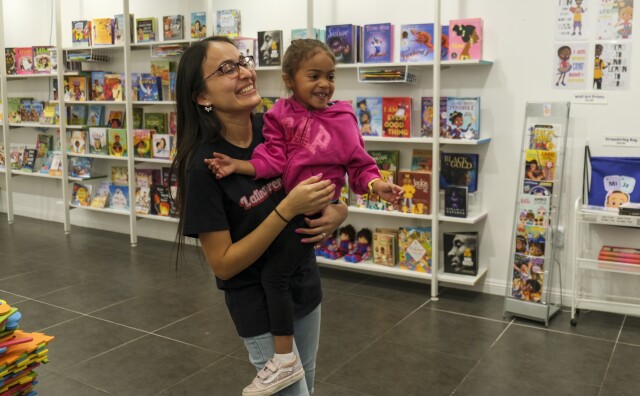Los Angeles Needs More Early Education Teachers. How About Parents?

Darya Carranza had never thought about becoming a teacher. As a child, she had wanted to do something that would help people; she toyed with the idea of becoming a nurse. But when she heard about a program that would cover the cost of tuition to become an associate teacher at a pre-school, it clicked.
“I thought about it and I'm like, 'oh my god, it's a perfect opportunity,'” she said. “And when I think about it, I do have four children. So, you know, you have four children only if you do love children.”
She said that when she started her family, she put her own career goals on pause and needed extra support. Now, Carranza said she has that through an L.A. County program that funds parents with kids in Head Start to take classes at local universities, like UCLA, and then become teachers in early education.
-
Explore high stakes Colorado River negotiations
-
Younger students prep for high-paying careers
-
Another Asian cuisine restaurant is planned
The teacher training program covers the cost of tuition, textbooks, permitting fees and child care.
“I know for moms that work that don't have a lot of support, it may seem like it's impossible for them to do something for themselves,” she said.
How big is the need?
County officials estimate that child care settings in L.A. County only have the capacity to serve 7% of working parents of infants and toddlers, mirroring a shortage of early childhood educators around the country. Earlier this week, the county announced a new two-year apprenticeship program that will be available to 90 county residents.
For the Head Start program, parents seemed like an obvious group to target, said Luis Bautista, executive director of the L.A. County Office of Education Head Start and Early Learning Division.
“In Head Start, we believe that parents are their children’s first teacher. They are a prime group that is already interested in their own children's development,” Bautista said.
Forty-four parents who completed the program last year have been hired as early childhood educators, and more than 60 are scheduled to complete the program this year, his office said.
What is the pay?
When LACOE first started the training program a couple of years ago, they had over 500 job vacancies in early education. It’s down to 200 now, but Bautista said the demand for teachers will continue, especially as California implements transitional kindergarten at school districts for all 4-year-olds by 2025.
-
The next cohort begins in August 2024 at Pierce College. The deadline to apply is June 30; 50 program slots are available.
Researchers estimate that if early childhood educators move to teach transitional kindergarten for 4-year-olds at school districts, their pay could double, which could worsen a shortage in traditional, low-wage child care settings.
“We wanted to make sure that there wasn't a drain right from one part of the system into the other. That we were able to support continuing to bring folks into early childhood education settings,” he said.
Baustista acknowledged that to retain people in all early childhood settings, their pay needs to rise across the industry.
“There has to be a public investment,” said Elizabeth Pufall Jones, a research director at UC Berkeley’s Center for the Study of Child Care Employment. “If we're going to be having the teachers train and they're going to be in this TK setting, there has to be a pay parity that comes online with the public schools in California.”
For Darya Carranza, she plans to eventually move into a site supervisor role at a preschool. After completing the associate teacher program this year, she’ll enter another program with the county to become a full teacher.
“Most of the time I do everything for [my kids] — extracurricular classes, taking them to school, baseball, basketball,” she said. “So here I finally get to learn something for myself, to do something for myself.”
-
Stephanie Moran Reed had to say goodbye in January to the bookstore she founded with her husband. The MiJa Books owner opens up on customer experiences, mom guilt, and a favorite book recommendation.
-
Madeline wrote to the county in mid-November asking for approval to have a unicorn in her backyard. Now the hunt begins.
-
#Snapback perpetuates unrealistic postpartum expectations.
-
Prowl with P-22, trace the life of a famed Black architect, Paul R. Williams, and meet a flower-spouting monster. There’s an illustrated story for readers of all kinds.
-
One L.A. County child care provider is turning decades of experience into videos that resonate with caregivers across the country.
-
Sharpen your pencils and open your spreadsheets. We’re going to talk about pregnancy and work — from family leave to accommodations during pregnancy, and where you can pump when you return to work.






